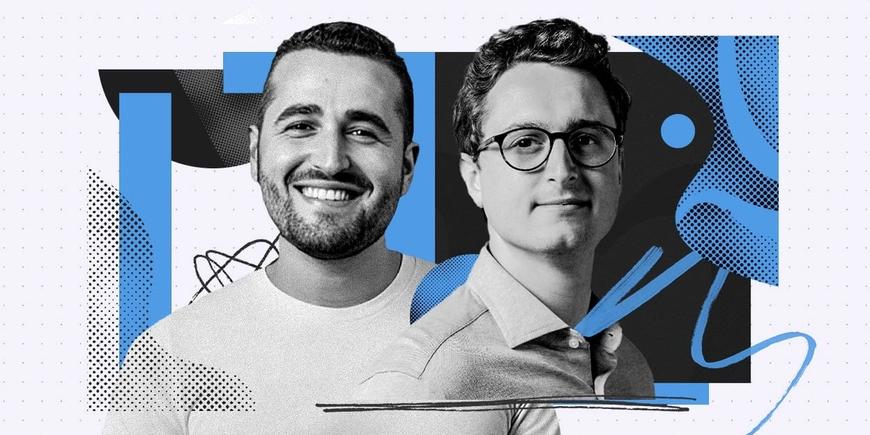How Alex Jekowsky is Bringing Tech to Fresh Laundry
75,000+ laundromats in the US are still stuck in yesterday’s wash, struggling to keep pace with modern tech. The addressable market? A whopping $60 Billion.

As he describes himself in his LinkedIn bio, our guest on the show, Alex Jekowskey, is obsessed with "unsexy" industries.
As the CEO of Cents, an in-store operations platform for laundromat owners, Alex and his team currently serve 1 in 14 laundromats across the country.
The TAM, as he describes it, spans the entire $60B garment care industry.
Cents recently closed a $40M Series B to equip laundromats with the tech they need.
In this chat with Alex we dive into:
- using his bar mitzvah money to start his first business
- scaling in laundry tech
- finding the right co-founder
- customer obsession
- building the right culture as a leader
I was reading about you and found out that both of us used our bar mitzvah money in very similar ways. You started a baseball camp, though. Tell me a little bit about that.
My first real "business," if you can call it that, was setting up a baseball camp in my backyard with a pitching machine and a batting cage.
It was a way for me to do something I loved—baseball—while making some money on the side. I dreamed of being a baseball player, but life had other plans.
Instead, coaching and teaching became my focus, even as a teenager.
Running summer camps, doing private coaching, and leading teams taught me a lot about balancing authority and empathy, dealing with both kids and their parents, and navigating different dynamics.
Was there something that happened when you were younger that inspired you to start companies?
When I was around seven or eight, I’d run a lemonade stand with a friend right in our local neighborhood.
We’d set up after soccer practice and even added a twist: fresh trout from fishing trips with my dad. So, along with lemonade and brownies, we’d try to sell fish too. It was a bit of a mixed bag, but I loved the process of creating something and seeing if people were interested.
It wasn’t about having a grand vision of becoming an entrepreneur. It was more about enjoying what I was doing and figuring out how to make it work.
I loved fishing, and I liked engaging with people through the lemonade stand. It wasn’t until later that I realized these experiences were shaping my approach to business.
Fast forward to my college days, I visited the University of Miami and saw these old-fashioned pin boards plastered with paper ads. I thought, “This can’t be the best way to communicate information.”
That’s where the idea for my first serious business, Scholars Add, came from. The concept was to digitize those pinboards and create a modern advertising network for students.
I raised $16,900 from an angel investor who believed in the idea. My first big expense was the logo. I was 17 and thought getting a great logo was a must. I ended up spending around $2,000 on it.
Looking back, it was probably a bit too much, especially for a company that was just starting out.
The logo had a capital “S” and “A” which, when combined in the URL, spelled “scholars sad”—something I only noticed after the business cards were printed. It was a bit of a mess, but I decided to stick with it.
Even with the logo fiasco, that experience with Scholars Add taught me a lot. I learned about branding, the importance of a clear vision, and the practicalities of running a business.
They were also the same designers I brought on board for the next iteration of the business, which became Ulyngo. They've been incredibly supportive and have stayed in touch over the years.
They were the first to truly believe in the idea outside of my friends and investors, seeing it as something cool and unique, and they were eager to help bring it to life.
If you were talking to a solo founder starting a company in college today, what advice would you give them?
I’d say, don’t worry about being number one from the start. There’s a lot of value in experiencing the tough stuff because it builds resilience.
Jensen Huang from NVIDIA once gave a talk at Stanford where he basically said, "I wish you immense suffering and pain," because it’s through that struggle that you really grow. So, don’t shy away from the hard parts.
When I started out solo, it was rough. But after about four years, when I met Ethan and asked him to join as a co-founder, it wasn’t about who was there from day one. It was about who was genuinely invested in making the business work.
You can bring on a co-founder at any point.
If you’re starting alone, don’t let that stop you from finding a great partner later on. Start building, and the right people will come along. Passion and dedication attract others who want to help.
After running your business for a few years, you ended up exiting the company. What led to that decision, and how did you navigate the transition?
As we were trying to raise what we thought was a Series A round—probably more accurately an institutional seed round—I realized we were in over our heads.
We were a marketplace, though I didn’t even know the term "FinTech" at the time. Our focus on higher education and ed-tech was seen as niche, and institutional investors weren’t keen on verticalized markets.
Despite building a solid product, distribution was a challenge. Our sales cycle was lengthy, and as a small team, we struggled to get traction.
Eventually, we engaged with a few firms that showed serious interest in leading our round. However, as discussions progressed, it became clear that they saw more value in acquiring us to integrate into their existing businesses rather than investing in our growth.
I found myself without the support of an investment bank or advisors, so we explored acquisition opportunities. We had serious conversations with several companies, and ultimately, we found a great fit with one.
This acquisition allowed me to experience working within a larger organization, learn about institutional investors, and understand what it’s like to operate within a bigger company.
The transition was smooth and amicable, which led me to explore new interests. With some liquidity from the sale, I turned my attention to small business investing, initially considering bars and restaurants.
However, I stumbled upon the laundromat industry, intrigued by its market dynamics and consolidation opportunities.
Despite initial skepticism from others, diving into the Coin Laundry Association and understanding the business led me to invest in and build a new venture focused on providing software solutions for laundromats.
I want to talk about the industry you’re currently operating in. How many laundromats are there in the US, and what does the overall market look like?
General market research points to around 30,000 to 35,000 laundromats in the US. On top of that, there are roughly 40,000 to 45,000 dry cleaners.
The number fluctuates a bit as some businesses close and new ones pop up, often getting bought by larger chains. So, overall, we're looking at about 75,000 laundromats and dry cleaners combined.
If we factor in other services like alterations, leather care, and sneaker cleaning, we add another 20,000 to 25,000, which brings us to roughly 100,000 garment care and repair retailers.
But that’s just part of the story. The market also includes online ordering brands and industrial cleaning services.
In places like New York, even people paying high rents might still use shared laundry rooms in their building basements. There are over 13 million of these shared laundry rooms across the country.
So, garment care isn’t just about local laundromats—it’s how everyone manages their clothing, and there’s no unified system for it. The market is much broader and more complex than it seems at first glance.
How does having a strong culture from day one impact scalability and what role does passion play in this?
A strong culture from the start is essential for scalability, but it needs the right framework to support it.
When you're leading a company, your team wants to follow someone who genuinely believes in what they're doing.
Without that belief, you're likely to end up with high turnover. It's crucial that we're not the bottleneck in fostering this culture.
Passion should be a fundamental part of the business, starting from the earliest teams.
If your culture isn't scalable, it might be because it wasn't solidly built from the beginning.
As the company grows, maintaining a good culture can be tough, but having a strong foundation makes it manageable.
At Cents, everyone in the company needs to be customer-obsessed, understand their responsibilities, be excited about outcomes, stay curious, and embrace diversity in both team culture and thought.
These elements of our guiding principles mean we don’t have to constantly push people to be passionate—it's just a part of who we are.
____________________________________________________________
Watch the full conversation featuring Jason Shuman and Alex Jekowsky on YouTube.
